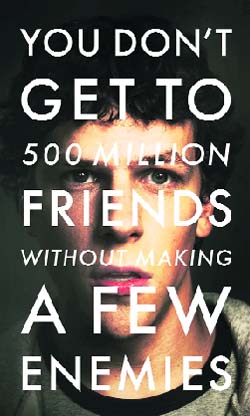Mark Zuckerberg is again in the news, in fact, his making it on the cover of Time magazine is news. Zuckerberg has been named the person of the year by the news magazine, despite the WikiLeaks founder Jullian Assange receiving more votes than him.

Like the most of the connected world, we all know the product that made Zuckerberg famous-Facebook. We have also been exposed to another side of him in the movie The Social Network, which opened to less-than-full halls in Chandigarh recently. For those readers who missed it, the movie paints him in fairly negative terms – socially awkward, insecure and an ego-maniac with a touch of deviousness. Is it true? We really don’t know, but movies tend to pick up historical themes and give them so much colour that they have little resemblance to history.
The Mark Zuckerberg character in the movie is negative, but others who have written on him and researched on him do not paint such a bleak picture. It is generally accepted that Zuckerberg had a girlfriend in the period which the film concentrates on, something that is definitely at odds with the movie that portrays Zuckerberg’s desire to impress his girlfriend with whom he had just broken up, and get social prominence as his prime motivation in developing Facebook.
Other critics fault many details, including the portrayal of the Internet entrepreneur and Napster co-founder Sean Parker as a paranoid hedonist, which is one-sided to say the least. The reason that I have devoted much attention to the movie is that often the celluloid character overtakes the real one. Whenever I think of George Patton, I remember the character I saw in the movie, the low-angle shot of George C. Scott who was addressing his troops with a massive American flag in the background. In the movie he comes as an irascible and egomaniacal character, which are definitely attributes he had, but were far eclipsed by his multi-dimensional personality that allowed him to come out a winner in situations that had overwhelmed lesser men.
For many, Mahatma Gandhi and Ben Kingsley’s portrayal of the man who led India to freedom are one and the same. Now, I dare say that practically everybody who reads this column has no danger of being portrayed, and thus misportrayed in the celluloid world. In that, we are safe! On the other hand, we all are leaking out parts of our lives through our online avatars as we interact with others on social networking sites like Facebook and other venues of public forums like blogs, and even through our comments on these blogs.
What we say reflects what we are, but when we do so in the real world, our listeners understand the context, and thus know what we are talking about. The non-verbal communication that takes place, plus the physical proximity of the participants in this social interaction gives it an edge, which is lacking in cyberspace.
On the Internet, we often are casual in our interaction, and this casualness leads to indiscretion. Then we pay dearly for it. There are many organisations that can piece together what you are, based on the bits of bytes that you post of yourself.
I too did something like that recently. I had a friend in New York called Joel. From time to time I had tried his name on Google with not much result, rather with too much results, since there were thousands of them. Recently, I again started thinking about him, and decided to find him, if I could. Well, this time I added bits of information that I knew about him, and was soon rewarded.
We reveal more than we want, and should do. Please be careful when you are online. It’s you life and your face on that Facebook account!
This column of Bits about Bytes by Roopinder Singh was published in the Lifestyle section of The Tribune.
